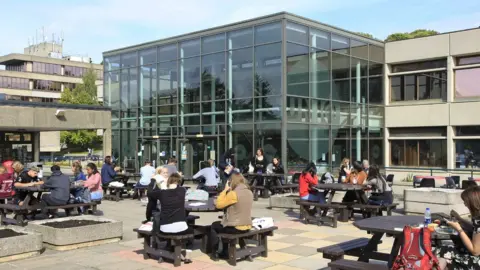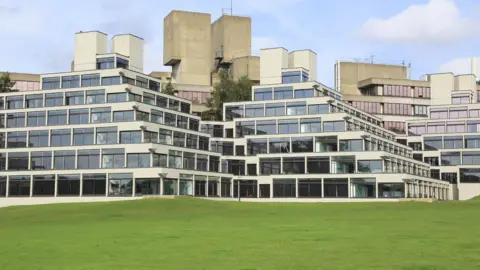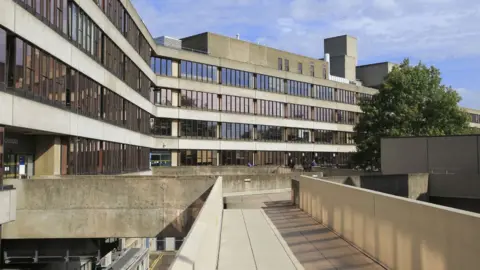How did the University of East Anglia end up facing a £30m deficit?
 Getty Images
Getty ImagesThe University of East Anglia has warned staff of possible compulsory redundancies as its £30m deficit for 2023-2024 is expected to swell to £45m in three years' time. What has gone wrong?

The shortfall
The university initially told staff it had a deficit of £23m.
Later, towards the end of February, it revealed "a revised budget deficit of £30m for 2023-2024, rising to £45m in three years' time".
To put that in context, the most recent accounts show UEA's total income for 2021-22 was £295.5m.
Compulsory redundancies have not been ruled out, but a spokeswoman for the institution said that option would be the "last resort".
The cause of the university's current woes, it said, was the combined "effects of Covid, the tuition fee freeze, pressures on student numbers and rising costs".
In an email sent to staff on 22 February, the then deputy vice-chancellor and current acting vice chancellor Prof Christine Bovis-Cnossen said student applications were "down again" and revealed the university was predicting an even bigger budget deficit.
 UEA
UEAFive days after that email was sent, the vice chancellor Prof David Richardson resigned.
In 2021-22, the UEA made a £74m loss.
That year it spent nearly half of its budget (£177.3m) on staff, £60.2m on pensions and £97m on "other costs".
A university spokesperson said: "We have been open about our financial challenges and the seriousness of the situation. We have a substantial additional deficit which must be addressed."
One unforeseen cost has been the huge rise in energy costs. This year the university's bill has risen by £5m and its leaders expect that extra cost to remain for the next three years.
The institution has also faced significant costs for "essential building work on campus".
Those include work to its Grade II teaching block, known as the Lasdun Wall.
Without "urgent repair", the university warns it might not be able to use the complex beyond 2025.
"The building is deteriorating fast," the spokesperson said, adding unless major repairs were carried out it might have "to be closed permanently".
The BBC asked The Office for Students, which is the independent regulator of higher education in England, whether it had held talks with the university.
It declined to comment.
However, it is understood the body does monitor the financial health of universities and colleges and can intervene if it is concerned.

Falling student numbers
Despite being ranked 27th in this year's Complete University Guide, student applications to UEA are down 16% on 2022, with 2,792 fewer seeking places at the Norwich-based university.
It would mean a reversal of the steadily growing student body shown in the most recent Higher Education Statistics Authority (HESA) figures, which show the total population growing from 17,805 in 2017-18 to 19,130 in 2021-22.
The undergraduate contingent has grown from 12,980 in 2017-18 to 13,935 in 2021-22.
A university spokesperson said: "Our student numbers for this academic year are significantly lower than we had planned.
"This is on top of a cumulative reduction in student numbers throughout the Covid years against our approved targets.
"The number of students leaving before completing their course is higher than previous years - in common with others in the sector - which also affects ongoing fee income.
"Capped domestic tuition fees, alongside wider issues such as rising energy costs, further compound the situation."
"While any reduction in undergraduate applications might impact on the future composition and size of the UEA student population, this might potentially be offset by both clearing activity in the summer and an increasing postgraduate intake this year, and in subsequent years.
"Therefore, it is not currently possible to indicate the longer-term impact on overall student numbers at this stage."

'Extremely worried'
 Getty Images
Getty ImagesThe university employs about 3,700 staff.
The financial situation has left them "extremely worried for the future", said one senior university academic, who asked to remain anonymous for fear of repercussions.
"Morale could not be lower," she said. "We have many colleagues who have moved to Norwich to make their lives here and start families, buy houses and were imagining living here for the next 10 to 15 years, or for the rest of their lives.
"They are absolutely devastated at the thought they might be facing unemployment."
"Many of us think the rot set in really quite a long time ago," she said, adding the resignation of the vice chancellor had done little to allay concerns.
"Many of us are not very interested in his resignation. It is clear we have been looking at a decline in the university whilst he has been at the top but he has been working very closely with a number of other people.
"All of those people remain in their positions.
"Everybody's operating costs have been going up and everybody suffered during Covid but we seem to have unique problems at UEA and they can be linked directly to failures of management."
She accused university management of being "reckless" and "completely unrealistic" with its predicted student growth.
"You've got wrong assumptions and wrong predictions and now the staff themselves are having to carry the can for these terrible management decisions," she added.
The university spokesperson said its student growth forecast had been "in line with historical trends which have since changed".
"At the same time, investment in our estate has been a priority," the spokesperson said.
"In November 2022, official planning permission and listed building consent was granted which allowed work to begin on Building Three (part of the Lasdun Wall). The main construction phase is planned to start in summer 2023.
"This work is essential not only to support our drive towards a net carbon zero campus by 2045 but to create modern science research laboratories and teaching and learning facilities for future generations of students and staff."

You might also be interested in:

 Getty Images
Getty ImagesBen Monks, regional support officer at the UCU, said the union was trying to establish "what had gone on, what was happening now and what the process was going forward".
Mr Monks said the pandemic had put "all sorts of pressures in all sorts of areas" but added: "Between then and now we've got a situation where an absolutely huge crisis seems to have grown.
"All of our members and staff are effectively at risk of redundancy."
The university spokesperson said: "We completely recognise that this is a difficult and concerning time for our staff.
"It is important that we keep our staff informed and this latest update gives additional context and timelines.
"Detailed business plans and potential impacts for every area of the university are being worked through.
"We have already stressed that compulsory redundancies would be our last resort after all other options have been considered. No decisions have been made at this point as to where those reductions in roles may be and it's important that we take time over such important decisions.
"We have also worked hard to reassure our students that courses will continue to completion and we will continue to make provision for student support - for example wellbeing, mental health, learning support and careers."

Find BBC News: East of England on Facebook, Instagram and Twitter. If you have a story suggestion email [email protected]
